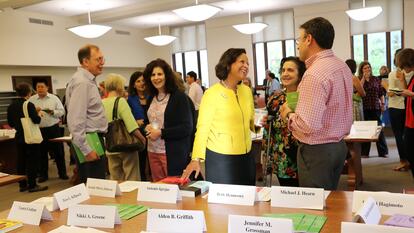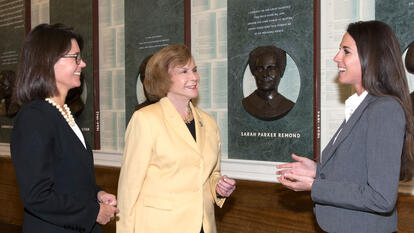
A big idea: Inspiration for a better world
The hottest July on record on planet Earth, continued reckoning with racial injustice and gender inequity, political polarization in the United States and around the globe, anxiety about artificial intelligence—there are plenty of problems in the world right now. We asked faculty and researchers from around the College for their big ideas for solving a problem related to their field, if time and money were not constraints. They came back with creative, interdisciplinary, and surprising ideas, finding inspiration in far-ranging places—medieval concepts of chivalry, an environmental advocacy group in Miami, Okla., what social science says about decision-making, and, of course, Wellesley students.
Wellesley classrooms are a natural incubator for big ideas. Codruţa Morari, associate professor of cinema and media studies at Wellesley, says she loves teaching at a liberal arts college because students are open to conversations about complex problems. “I wouldn’t be doing what I am doing if I did not believe that looking at history with a critical lens teaches us something about what we can do to change the future,” she told us. Read on to learn how these scholars would change the world for the better.
EMPOWER SURVIVORS OF INTIMATE PARTNER VIOLENCE THROUGH VOCATIONAL TRAINING
Pinar Keskin is an associate professor of economics. She also serves as a research fellow at the Women and Public Policy Program at Harvard Kennedy School.
Intimate partner violence is a widespread problem that goes beyond borders, affecting people from all walks of life. In developing countries, this issue gets even worse due to limited resources, cultural norms, and inadequate support systems. Those experiencing intimate partner violence often can’t break free due to financial dependency, leading to ongoing cycles of abuse.
This is why well-equipped shelters that offer temporary accommodation, counseling, and legal support for victims are so important. But with enough funding, there’s a chance to do more—by creating vocational training programs designed specifically for the shelter residents. These programs would cover various areas, from hands-on trades like carpentry and tailoring to modern skills like tech and entrepreneurship. And it’s not just about learning the vocations; these programs would also teach important life skills like communication, leadership, and financial literacy to empower survivors.
Securing necessary funds matters, but governments, NGOs, and local communities also need to collaborate to keep these programs going. Governments can integrate them into social support systems, NGOs can provide their know-how in program design and delivery, and communities can play a pivotal role in raising awareness, promoting acceptance, and supporting survivors as they transition into new economic roles.
This job training isn’t just about money. When survivors gain financial independence, it creates a domino effect of change. They become role models, inspiring others to leave abusive relationships. As more people gain independence, society starts rethinking old ideas about gender roles, slowly breaking down the reasons behind the persistence of intimate partner violence.
This is an excerpt from a story by Lisa Scanlon Mogolov ’99 that appears in the fall edition of “Wellesley” magazine. Read the full story on the magazine’s website.



